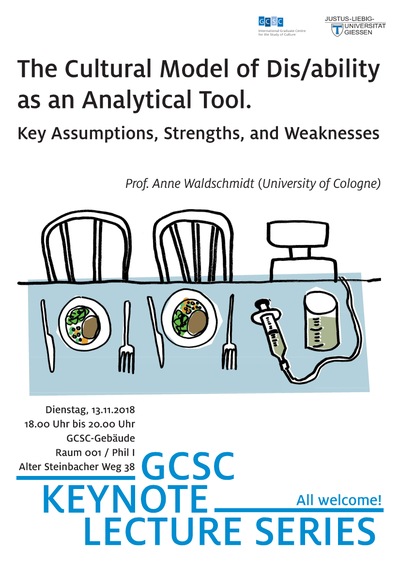WiSe 2018/19: Contact Zones in the Study of Culture
Anne Waldschmidt (University of Cologne, Germany)
The Cultural Model of Dis/ability as an Analytical Tool. Key Assumptions, Strengths, and Weaknesses
13.11.2018, 18-20, room 001, MFR

Abstract
Drawing on the approach of disability studies this lecture claims the relevance of culture as an analytical category for the study of disability. It starts with differentiating several fields of research that focus on disability; then it explores the notion of culture. Next, it appreciates the social model of disability, sketches its history and resulting debates. It also provides an overview on earlier attempts of conceptualizing a cultural studies approach to disability. Further, it offers an analytical perspective that uses the concept of ‘dis/ability,’ analyses impairment, disability and normality as ‘empty signifiers,’ views dis/ability as naturalized and embodied difference, and understands this category as effected by symbolic orders, bodily practices and social institutions. Additionally, referring to the debate on independent living for persons with disabilities as an example, the lecture will highlight the heuristic value of the cultural model of dis/ability for both research and practice by describing guiding questions resulting from individual, social, and cultural models of disability. It concludes by discussing possible pitfalls of a cultural studies approach to dis/ability.
See the recording in our Video Archive
Vanessa Andreotti (University of British Columbia, Canada)
The Enduring Educational Challenges of Setting Horizons of Hope Beyond Modern-Colonial Imaginaries
04.12.2018, 18-20, room 001, MFR

Abstract
As societies face unprecedented challenges that are global in scope and “wicked” in nature, the usual educational response has been to emphasize the need for more knowledge, better policies, and more compelling arguments, in order to effectively convince more people to change their convictions, and, as a consequence, their behaviour. My research collective has been experimenting with a different educational orientation that does not see the problems of the present primarily as rooted in a methodological challenge of better strategies (i.e. the call for more effective policies and communications), nor an epistemological challenge of knowing (i.e. the call for more data, information or perspectives). Rather, we propose that the problems are rooted in an ontological challenge of being (i.e. the call to address how we exist in relation to each other and the planet). From this educational orientation, the problems lies in the universalization of a modern/colonial imaginary that creates intellectual, affective and relational economies that invisibilize the violences that subsidize modern/colonial systems, and that hide their inherent unsustainability. The modern/colonial approach to education has left us unprepared and unwilling to address our complicity in systemic social and ecological harm, and to set our horizons of hope beyond what is intelligible and desirable within it. In this talk, I will share some of the social cartographies, analyses and experiments of the “Gesturing towards decolonial futures” collective and the “In Earth’s CARE” network of social-ecological innovations focused on transformative justice.
See the recording in our Video Archive
Harry Lehmann (Berlin, Germany)
Conceptual Art and Music. Conceptualism as a Hot Contact Zone of the Arts
11.12.2018, 18-20, room 001, MFR

Abstract
Contemporary art describes itself very often as “conceptual.” However, what exactly does it mean? Usually, these artworks in question have little in common with the prime examples of Conceptual Art from the 1960th. It is of paramount importance for art theory today to have a clear understanding and a clear notion of the conceptual character of the arts. In my lecture, I would like to present a model of Conceptualism which allows to integrate into this model such different pieces like “One and Three Chairs” by Joseph Kosuth and the “Fettstuhl” by Joseph Beuys, or, in respect to music, 4’33’’ by John Cage and “Pendulum Music” by Steve Reich. Conceptual art arose in opposition toward the aesthetics of classical modernism. Conceptual artists tried to show that art can be separated from any aesthetic experience and reduced to one single idea. Nevertheless, the anesthetic character is not the decisive criteria for Conceptualism. My thesis is that Conceptual Music and Conceptual Art are based on the principle of an isomorphic mapping between idea and work. On the one hand, the idea of the artwork manifest itself entirely in the piece, and on the other hand, every perceivable aspect of the artwork is a representation of that idea.
See the recording in our Video Archive
Sophie Ratcliffe (University of Oxford, England)
Reading Well. The Trials of Bibliotherapy and the Hospital Library as Contact Zone
18.12.2018, 18-20, room 001, MFR

Abstract
Taking the idea of the hospital library as a central case study, this lecture draws on the spaces between medicine and the humanities, particularly the different ways of reading and knowing that seem inherent in each discipline. The notion of reading to get well, or ‘bibliotherapy’ is broadly established in current usage in the social sciences and humanities, but the word’s first appearance, in an issue of the Atlantic Monthly magazine in 1916 was meant as a joke. Something of this vulnerability remains on both a micro and macro level, as arts-based interventions try to justify themselves in medical contexts, and in the precarious status of the humanities in a global funding context geared towards the sciences.
A study of the East London Children’s Hospital library catalogue, which survives from the nineteenth century, is thought-provoking in the light of these contemporary questions. While we can recover something of Victorian reading habits and mores from looking at the archival material, this lecture will reflect on the difficulty of reading this (or any) hospital library space ‘well’. Articulating and placing a use-vale on a space which is, both ‘under-theorized’ (Nethersole, 2011) and riven by affective forces may be an impossible and counterproductive task. The lecture will conclude with reflections on possibilities for public engagement for those in the humanities – particularly the difficulties of translating ideas of affect and anecdote in a world dominated by measurement and evidence.
